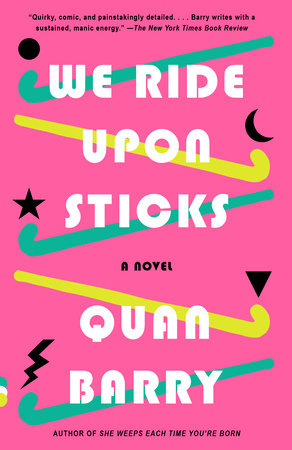We Ride Upon Sticks, by Quan Barry

I really did not know what to expect from this book when we chose it for the reading group, but I was definitely optimistic. Just from the title, I was expecting a lighthearted romp full of charming but misunderstood witches. And with a setting in modern-day Salem, what could go wrong?
The book did start out that way. The witches in question were members of a high school field hockey team, and the sticks in question were their hockey sticks. Nicely done! Their invitation to witchcraft was their lovable desire for a winning, or at least not terribly embarassing, sports season. Great setup, so hilarity was sure to ensue.
Not so fast. There are many funny moments in the book, and there are characters that one can care about. But the book just didn't work for me. One of the things that constantly irritated me was the way the author emphasized the characters looks. One has a hairdo that looks like a "claw", and the claw essentially becomes a secondary character. Another has a lesion on her neck that also becomes a character. One more has a unibrow, another one has large breasts, another one has a dramatic "Chin", and on and on; at least none of those body features became sentient.
And then there are the consequences. Of course, there have to be consequences, but as the characters descended deeper and deeper into the dark arts, they became increasingly petty, mean, inconsiderate, and just plain unlikeable. The peccadillos spiraled from white lies to property damage, literal fires, bodily harm, and even criminal acts. This is not empowerment or mischief. This is simply unconscionable. What bothers me here is that this book feels like a Young Adult book, but what it seems to be telling young adults is not the positive message I would prefer them to hear.
And seriously, can we not write a book about teenagers that isn't overwhelmingly consumed with sex? The teenagers are very curious and fearful and excited. I get that. But even the adults can't seem to talk to one another without thinking about their looks and sexual possibilities. Seriously?
The ending left me flat. For one thing, forget about all those consequences. The characters are not paying a lasting price for what they did. It is fair to say that lessons were learned, but what about the people harmed along the way? What happened to them? There is, perhaps, a soft message of empowerment to be had in the denouement, but it is too little and too late. And in any case, if the point is that the power was theirs all along, what about the fantastical elements in the story, like the sentient hairdo and the telepathy? What were those?
